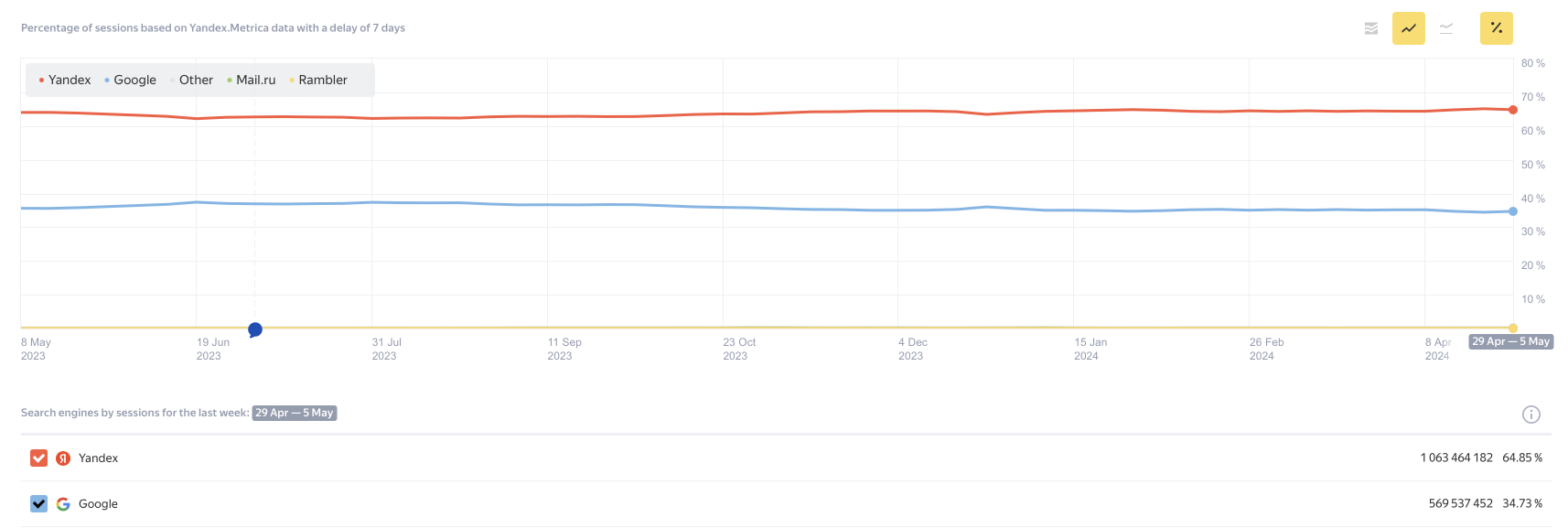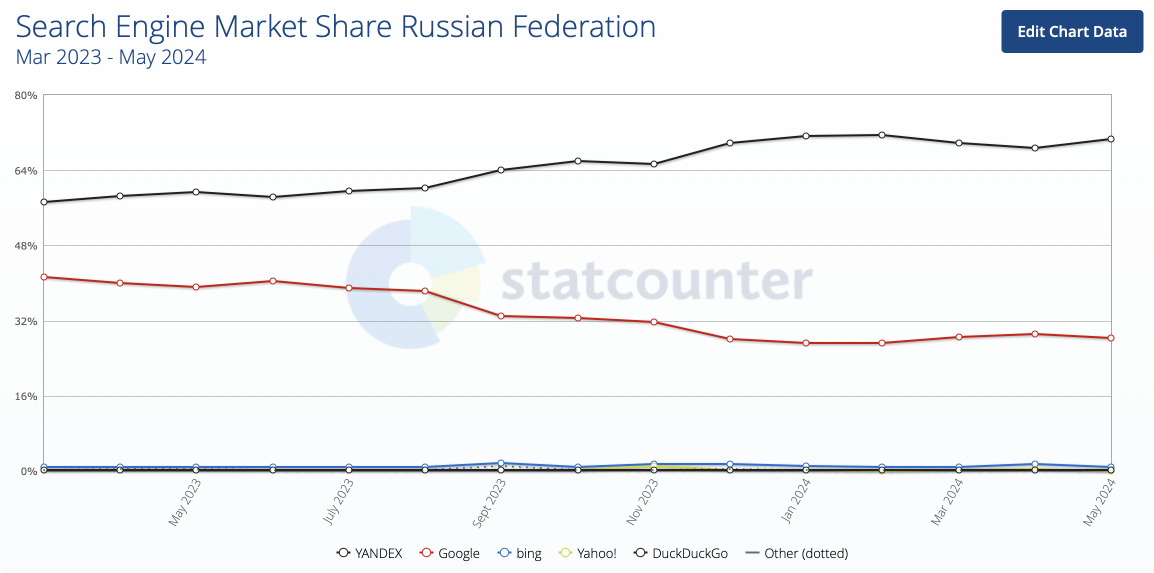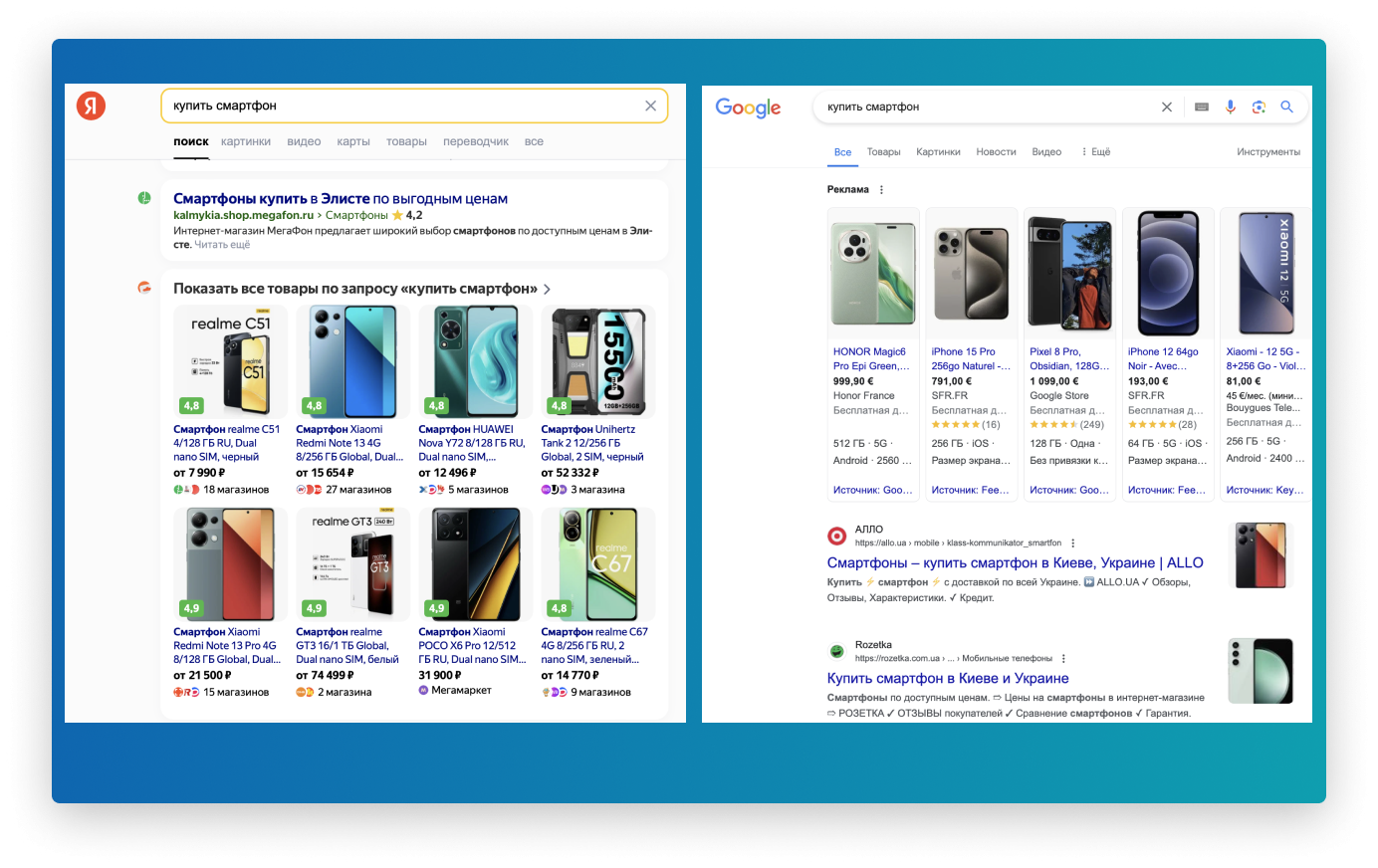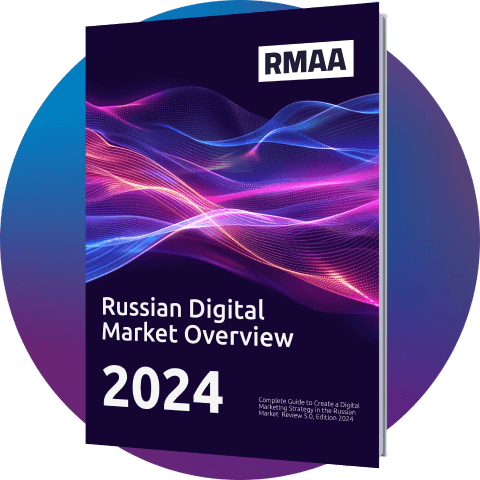Blog about successful marketing strategies in russia
From Google to Yandex: Unraveling the Secrets of Search Engine Marketing in the Russian-speaking Market


DIGITAL MARKETING
Share this Post
Brand promotional activities start with the selection of a search engine. Which one is currently on top for Russian users? What opportunities does it have? These questions will be relevant for a specialist from anywhere of the world, since there is always a choice between engines and it is impossible to say that one of them is completely leading the market or that its functionality meets all requirements and 100% solves business problems.
In Russia, in spite of the fact that many foreign marketing tools have been blocked since 2022, the situation with contextual advertising is quite ambiguous. It seems that Google.Ads functionality is unavailable, but the audience keeps using Google products. At the same time, the Russia's search engine Yandex offers the best terms and conditions for paid aspects of promotion. Therefore, it is necessary to “maneuver” between different tools, choosing the best possible one or several of them at once.
How to promote a brand through search engines in Russia? RMAA experts shared their own experience.
Analytics of Russian search engine users
Over the past few years, Google and Yandex have been among the most popular search engines in Russia. But it is problematic to find out what shares are occupied by each of them on the market. Since the metrics of different sources differ significantly from each other.
According to Similarweb, Yandex is ranked #1 in Russia (3.3B Visits in May 2024), and Google significantly inferior to its competitor (144.8M Visits in May 2024).
|
|
|
|
|
|
|
|
|
|
|
|
|
|
|
|
|
|
|
|
|
|
|
|
The LiveInternet portal metric shows Google in the lead, but with different figures – about 56.1%. In this case, Yandex's share is approximately 43.7%.
|
|
|
|
|
|
|
|
|
|
|
|
|
|
|
|
|
|
|
|
|
|
|
|
At the same time, the analytics of Yandex Radar are completely opposite. Yandex has a significant market share here (64.85%). Google with 34.73% is behind.

Why are the indicators so different? Everything depends on the choice of a web analytics calculation tool. Thus, Similarweb measures data on 4 types of sources (websites, partners, public data and the Contributory Network aggregator). LiveInternet collects information from 576 thousand websites. Both resources analyze the number of users, which is hardly the best way, from our point of view. Since each of them can go to the website several times. Yandex Radar has a different system based on its own algorithms. But they only take into account traffic from counters of Yandex. Metrics. Again, it does not 100% reflect the real situation on the market.
The StatCounter service, which uses the number of transitions from a search engine as the main metric, shows the most optimal picture of events. According to StatCounter, we get the following (data are presented for March 2024 - May 2024). In Russia, Yandex's share in search results for all types of devices is currently 70.%. It is is much more the share of Google Chrome (28.11%). The audience uses Yandex search engine (73.93%) more often than Google (24.44%) from desktop. Also, Yandex leads in the number of transitions from smartphones: Yandex (67.53% ) and Google (31.77%). This tells us that users favor Yandex even in the mobile version. Although most smartphones have their initial settings on Google Chrome.

Of course, Yandex ranks first in Russia. At the same time, Google's organic search should not be downplayed. In addition, the algorithms and tools of Yandex and Google differ from each other - this should also be taken into account.
Types of advertising campaigns in Yandex Direct and Google Ads
So far, contextual advertising is one of the main tools of almost any marketer. It works perfectly with different tasks and audiences, but only with a competent approach that requires deep expertise from an advertiser.
Irrespective of the choice of a search engine, context advertising can be conditionally divided into two types: search engine advertising and network advertising. Plus, there are additional options and nuances when working with a particular search engine.
Contextual search engine advertising is displayed in search engine result pages and on partner websites. Besides advertising of a brand page, a trade campaign with advertisements that contain product card with a price can be also launched aimed mainly at promotion of online stores.
The main feature of this type is the response to a specific, relevant query of users at a time when they are entering it in the search box. In other words, a contextual search advertisement is shown only to those who are independently searching for products/services using engines. The price of such advertising depends on clicks and conversions. It means that an advertiser only pays for user's target action and independently determines the maximum cost to place an ad.
Main ad units in Google and Yandex search results are similar. Up to 4 ads can be shown here, further down the list: organic search result on a user's specific query. With the only difference in location of a product gallery, which is placed ABOVE the search results on Yandex and ABOVE/TO the RIGHT on Google. In addition, a promotion through mobile search is available on both search engine.

Advertising on networks is placed on websites, in mobile apps and other partner resources of the selected search engine. In general, this type of promotion can be called supplemental information to the content of search pages viewed by a user. But here it is not required to enter a specific query to display ads. A user could have been interested in these (or similar) goods/services earlier or could have been on a website with similar topic right then.
In other words, the main objective when launching network advertising is to show it to users who have somehow shown interest in what is being advertised. To do this, Yandex uses YAN (Yandex Advertising Network), and Google uses GDN (Google Display Network).
The first one includes more than 50,000 websites, video services, mobile applications and Smart TV, Yandex own products (Yandex Mail, Yandex Video, etc.). According to Yandex data for 2022, the average daily share of YAN users is about 42 million people. Moreover, the target in the YAN can be thematic (according to the content of the page), behavioral (according to user behavior on the Internet), with retargeting (for users who have already viewed the company's website), by user segments on Yandex Direct (contact details, geo, mobile device IDs, etc.).
Due to Google's global reach, GDN has more than 2 million websites and applications for about 90% of Internet users worldwide. This also includes YouTube, Gmail and other developer products. Unlike YAN, targeting by GDN allows you to select specific sites for advertising (or all at once), or configure settings by audience (gender, age, geo, interests, etc.). To work with loyal users, remarketing is also included here, similar to retargeting on YAN. Unfortunately, promotion via GDN is not available in Russia. However, it can be used in CIS countries.
Pais ad pricing
Two parameters are used to determine the price of paid advertising, which are rate and quality.
Rate is the maximum cost per click, impression or conversion of an advertisement, that is, how much an advertiser can pay for one of these actions.
Quality is the relevance of an ad to the key queries of contextual advertising.
Accordingly, the more user clicks on the ad, the higher the quality indicator. Furthermore, auctions are conducted for each Yandex.Direct and Google Ads query, where the rates with the quality indicator of various advertisements are compared. The result will be an order of ad viewing for specific keywords. A high quality advertisement reduces the rate, and such an advertisement should take a higher position than one of less quality with a high rate.
There is price difference between placing an advertisement on Yandex and Google, but it is not so significant. It all depends on many factors, including the geography of placement, audience, etc. The advertising system will show an approximate cost before launching the campaign: when loading the ad and specifying targeting parameters. However, it will not be possible to calculate the exact amount.
Again let us remind that running paid advertising via Google Ads will be problematic in Russia. Therefore, it is better to trust the algorithms of Yandex.Direct. By the way, we have already written about its advantages.
SEO promotion in the Russian market
Despite certain Yandex and Google similarities, the systems differ from each other in requirements to SEO. Which, in turn, have an impact on the display of websites in search results. Thus, Yandex puts emphasis on behavioral metrics. But Google takes care of the content expertise, updateability of websites and good link profile.
What else should be taken into consideration when choosing a search engine for promotion?
Regional assignment is available on Yandex including cities and regions. It is enough just to add this information to Yandex.Webmaster and Yandex.Business. However, Google does not have such a detailed localization – only a country. Which is not very convenient for the Russian market having many regions with different types of audiences.
Behavioral factors. Again, the time spent on a website, page depth etc. is of most importance to Yandex. Based on this data, the search engine determines the resource quality. That is, if the metrics are high, then the site automatically rises in search results on query. (Provided there are no fake engagements, which are checked by Yandex system administrators). For Google, surely, behavioral factors have a certain weight, but it is not so considerable.
Commercial ranking factors are also more relevant for Yandex, which tracks product prices, product matrix, contact details, payment method information, transaction elements and the accuracy of all of the above parameters. All this allows you to achieve the best SEO results on this search engine. Google takes into account similar factors, but places emphasis on the link profile. Quite often, the TOP search sites are occupied by resources that have a large volume of external links.
Text ranking factors also differ from each other in different parameters. Google puts major focus on large texts and regular content updates. Yandex will look at the accuracy in the use of words, absence of mistakes and misprints. Despite this, both search engines strive to broadcast high-quality content. Therefore, main attention should be given to it in SEO.
Website Age is of importance to Google to a greater extent, since one of the important ranking factors of the system is the age of the domain. While on Yandex, a new site with high-quality content may well occupy the TOP positions of the search result.
A mobile version plays an important role on Google because of its Mobile-first indexing algorithm. That is, when ranking a site, the mobile version is primarily used. If the resource is not adapted for smartphones and tablets, then the chances of taking the TOP positions on Google are quite small. Yandex pays attention to this parameter, but only to evaluate user behavior.
Display in search results is different for both search engines. Yandex must have a title (up to 70 characters), a description (up to 170 characters) and icons that allow you to get additional information about the site. For example, a popular website (high traffic), user choice (high level of engagement and a large number of visitors), favicon, etc. Google will display the following: title (up to 70 characters), description (up to 140 characters) and favicon, but only for the mobile version.
Search results are one of the most important indicators for working with contextual advertising. There are also differences here. According to the same query on Yandex, on the first pages you can see mainly aggregator sites with a huge selection of offers. At the same time, Google will show thematic profile sites of companies providing a specific service.
Working with keywords. Perhaps a separate article can be written about this factor. :) After all, the mechanisms of work differ even at the stage of entering keywords into the system. For Yandex, the optimal density of keywords entering the system is about 3-4%. If there is more, then pessimization of the site and sanctions are possible. Google has a higher threshold – up to 12%, and word forms for the Russian version of the system are almost indistinguishable, which is why repetitions are possible. On Yandex, repetitions of keywords can be perceived negatively.
Thus, despite the difference in search engines, there are three main factors that should be taken into account when working with both Yandex and Google.
- Firstly, the emphasis is on unique text content, on which the result of the site's output in the general search bar depends to a greater extent.
- Secondly, working with keywords in the title, description, meta tags and in the main text.
- Thirdly, the construction of a certain volume of links that lead to the site from other resources. The most valuable are popularity, credibility (opinion leader), correspondence of the site subject to links and the number of links. Keep in mind that too large number can negatively affect the promotion.
All other aspects on which Yandex and Google rank websites in search results will be different – and it is also necessary to understand at the stage of creating a website. To take into account all these factors and create a resource that will be able to take a leading position in the search in the future, it is better to use the help of good specialists.
RMAA experts are ready to advise you on all issues related to paid advertising and SEO on the Russian market. And also: to create a new website from scratch or conduct a detailed audit of an existing website, prepare and implement the most optimal promotion strategy taking into account both search engines, the specifics of your business and budget, ect. In short, we provide a full range of services that are necessary for the successful promotion of business in Russia. Trust our experience, skills and expertise!
To get in touch with an RMAA manager promptly, please fill out the application form in the contact.
Join 2,000+
of your Peers!
You will be the first to know about Russian marketing insights, news and updates from our agency. Stay tuned!
Get our latest articles delivered to your email inbox and get our exclusive White Paper
"Digital Marketing in Russia. Finding your customers on the internet"
for FREE!
Russian Digital Market Overview
Strategic Insights into Russian Digital Marketing Landscape

Ready to partner with the specialists in Russian marketing and advertising?
About the Author
Digital Strategist. Head of one of the project groups at RMAA. Maria started her journey in digital marketing in 2009.
Join 2,000+ of your Peers!
Get our latest articles delivered to your email inbox and get our exclusive White Paper "Digital Marketing in Russia. Finding your customers on the internet" for FREE!
You will be the first to know about Russian marketing insights,
news and updates from our agency.
Stay tuned!















